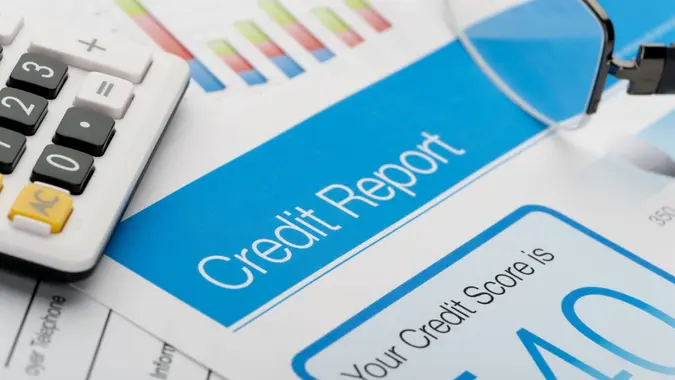This Monthly Bill Is Actually Hurting Your Credit Score — Focus On These 5 Factors To Boost It

Commitment to Our Readers
GOBankingRates' editorial team is committed to bringing you unbiased reviews and information. We use data-driven methodologies to evaluate financial products and services - our reviews and ratings are not influenced by advertisers. You can read more about our editorial guidelines and our products and services review methodology.

20 Years
Helping You Live Richer

Reviewed
by Experts

Trusted by
Millions of Readers
Your credit score plays a major role in your financial life. A good credit score will help you qualify for loans and access better loan and insurance rates. You probably already know you should try to keep your score as high as possible, but you might be hurting your credit instead with one common mistake.
Many people believe the myth that carrying a monthly balance on their credit cards will help them boost their credit, but that’s simply not true. Purposely carrying a credit card balance can hurt your credit instead of helping it. If you’re falling into this trap, it’s time to shift your approach.
Use this guide to understand the factors affecting credit scores and try these tips to boost your credit score instead.
How Does Carrying a Credit Card Balance Affect Your Credit Score?
Your FICO credit score is based on five categories of information, each weighted differently. Here’s the breakdown of these five components and how much they impact your score.
- Payment history: 35%
- Amounts owed: 30%
- Length of credit history: 15%
- New credit: 10%
- Credit mix: 10%
The second largest factor in your credit score is the total amount you owe. When you owe a larger amount, you’re using a higher percentage of your total available credit, also known as a higher credit utilization. Higher credit utilization tells lenders that you may be overextended, resulting in a lower credit score.
So, how does this relate to carrying a monthly credit card balance?
When you carry a monthly credit card balance, your total amount owed and credit utilization ratio increase. Your credit score may go down somewhat as a result. Even if your score doesn’t decrease, purposely carrying a balance will not boost your credit. As FICO’s senior director of analytics and scores, Tommy Lee, said, “Carrying balances from month to month and incurring interest fees does not help your credit score.”
Tips To Boost Your Credit Score
If you’re trying to increase your credit score, focus on improving the factors that affect your score. Apply these tips.
Keep Making Payments on Time
The payment history component of your credit score shows your track record of debt payments. Consistently making on-time payments on all your debts will help improve this factor, ultimately boosting your credit score.
If you’re struggling to keep track of all your bills and pay them on time, write a list of all your bills, their due dates and minimum payment amounts. On some of your debts, your minimum payments may change from month to month, but try to estimate them.
Then, set a budget that allocates money to cover all your minimum payments and necessities first. Sign up for automatic payments or payment reminders so you don’t miss any due dates. If you still have trouble making your payments on time, you can always contact your creditors for help.
Keep Your Balances Low
Try to keep your debt balances as low as possible. Lower debt balances will reduce your credit utilization ratio and total amount owed, helping to improve your credit score.
Some people find it helpful to pay for things in cash instead of charging their credit cards. Using cash may make you more mindful of your purchases and reduce your credit card balance. If you have extra money one month, consider putting it toward one of your debt balances. Extra payments will bring down your balances faster and get you closer to the higher credit score you want.
Avoid Applying for New Credit Often
Lending Tree’s chief credit analyst, Matt Schulz, recommends not applying for too much credit too often as a way to improve your credit score. A longer credit history leads to higher credit scores. Because a new credit account will bring down the average age of your accounts, regularly applying for new credit can hurt your score.
Opening many new credit accounts in a short time also impacts the new credit factor of your score, so it’s doubly important. Only apply for new credit accounts when you absolutely need them. Weigh the costs carefully since it can take a long time to bring the average age of your credit accounts back up.
Consider Your Credit Mix
Your credit mix only makes up 10% of your credit score, so it’s not the most important factor. However, if you’re trying to get your score as high as possible, you should try to have a mix of credit accounts. These may include installment accounts and revolving accounts.
Examples of installment accounts:
- Student loans
- Car loans
- Mortgage loans
Examples of revolving accounts
- Retail store cards
- Credit cards
- Home equity lines of credit (HELOC)
- Gas station cards
Having at least one installment account and one revolving account may help boost your credit score. However, it’s probably not worth applying for a new line of credit simply to improve your score.
 Written by
Written by  Edited by
Edited by 
























